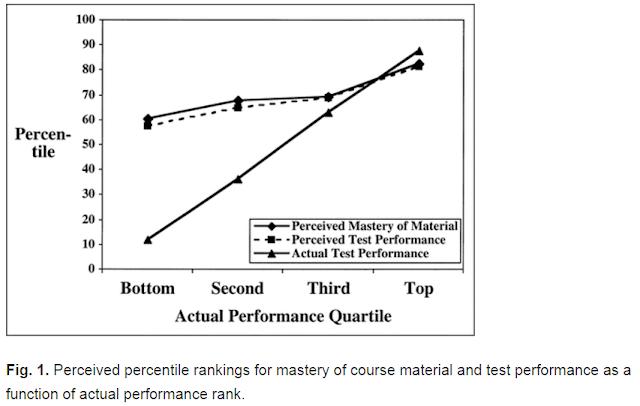"What You Don't Know Won't Hurt You"
This is what Dave Ramsey of Financial Peace Revisited thinks about this saying: “That stupid saying "What you don't know can't hurt you" is ridiculous. What you don't know can kill you. If you don't know that tractor trailer trucks hurt when hitting you, then you can play in the middle of the interstate with no fear - but that doesn't mean you won't get killed.” I guess we should fix that saying then to "What you don't know can hurt you". But in education, we could go further and write a saying that provides a useful message: "What you think you know but actually do not know will hurt you."
It does appear that top performers tend to be a bit modest while bottom performers greatly exaggerate their abilities. Dunning et al. call it a "double curse" - those who do not have the knowledge or skills are likewise those who cannot gauge their own knowledge or skills.
We are often ignorant of our own incompetence. This is according to a study published in the journal Current Directions in Psychological Science:
 |
| Above copied from Dunning, D., Johnson, K., Ehrlinger, J., & Kruger, J. (2003). Why people fail to recognize their own incompetence. Current Directions in Psychological Science, 12, 83–87. |
It does appear that top performers tend to be a bit modest while bottom performers greatly exaggerate their abilities. Dunning et al. call it a "double curse" - those who do not have the knowledge or skills are likewise those who cannot gauge their own knowledge or skills.
German researchers took the above study to another level to find a way to correct overconfident judgments in learning. In a paper published in the Journal of Educational Psychology, they find that by informing college students of the dangers of making overconfident judgments of learning, the students become more cautious of deciding how much they actually understand a lesson. With greater comprehension monitoring or a more honest acknowledgement of one's understanding of a lesson, the student is presumably more open to additional explanations. Indeed, with less overconfident judgments, a student even improves academic performance. Unfortunately, this appears to be true only for college students. High school students, in contrast, continue to perform poorly even with the acknowledgement that they still need to learn. Apparently, high school students (at least in this study) need to be taught as well effective strategies to overcome comprehension problems. What is effective is not rereading the material. The strategies provided to the student are explaining content using only one’s own words and thinking content through using one’s own examples. With training on these strategies, the high school students also show improvement in learning outcomes.
Thus, thinking we know something when we do not prevents learning, but in addition, as we find ourselves not understanding something, we need strategies that will not allow us to fool ourselves again that we know something when we do not. That strategy starts with requiring us to explain what we know to ourselves and to others.
Comments
Post a Comment